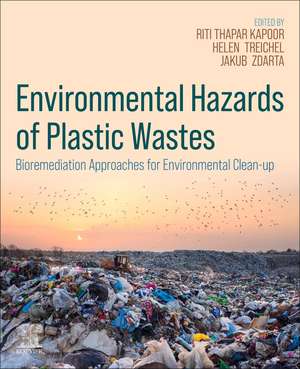Environmental Hazards of Plastic Wastes: Bioremediation Approaches for Environmental Clean-up
Editat de Jakub Zdarta, Riti Thapar Kapoor, Helen Treichelen Limba Engleză Paperback – 28 feb 2025
The treatment of plastic wastes with environmentally benign approaches will be assessed in this book and will also provide ways to protect our natural environment by managing hazardous plastic pollutants through various techno-based, eco-friendly strategies.
- Describes how bioremediation approaches can be successfully applied for waste management, eco-restoration, and environmental protection
- Provides information on the state-of-art application of microbes, whether individual or synergistic, for treating plastic waste and environmental protection
- Offers a substantial contribution to solving the problem of plastic waste which contains many hazardous organic compounds
Preț: 704.17 lei
Preț vechi: 922.55 lei
-24% Nou
Puncte Express: 1056
Preț estimativ în valută:
134.74€ • 141.06$ • 111.49£
134.74€ • 141.06$ • 111.49£
Carte nepublicată încă
Doresc să fiu notificat când acest titlu va fi disponibil:
Se trimite...
Preluare comenzi: 021 569.72.76
Specificații
ISBN-13: 9780443235993
ISBN-10: 0443235996
Pagini: 305
Dimensiuni: 191 x 235 mm
Greutate: 0.45 kg
Editura: ELSEVIER SCIENCE
ISBN-10: 0443235996
Pagini: 305
Dimensiuni: 191 x 235 mm
Greutate: 0.45 kg
Editura: ELSEVIER SCIENCE
Cuprins
1. Plastic in the environment, properties, types, and application
2. Hazardous effects of plastic waste on the ecosystem, human-beings, and animal health.
3. Microplastics in marine ecosystem and Current trends in environmental pollution and mechanisms of toxicological profile.
4. Biodegradation of plastics: current scenario and prospects for environmental safety
5. Accumulation of plastic waste in the natural environment. and its life cycle assessment
6. Relevance of microbes in plastic waste degradation
7. Fungal degradation of plastics
8. Bacterial degradation of plastics
9. Synergistic approaches for the bioremediation of plastic pollutants
10. Role of earthworms in the degradation of microplastics
11. Mechanism of plastic biodegradation
12. Role of microbial enzymes in the degradation of plastics
13. Use of waste plastic in preparation of value-added construction materials.
14. Bioplastics for circular economy
15. Current achievements in removal of plastic wastes, new technologies involved and economics
16. Application of plastics for production of fuel
17. Recent development in the use of enzymes for degradation of microplastics
18. Economic approaches for plastic waste removal/disposal and reuse.
19.Mechanism and pathways for recycling of plastic wastes and application possibilities.
20. Practical strategy to reduce supermarket plastic bags with technical and economic data and to check its global impact on pollution reduction
21. Case studies from Asia, Europe, and America for plastic waste removal/recycling
22. Monitoring tools and technologies for plastics in the natural environment (soil, sediment, water)
23. Regulations, policies and acts related for the management of plastic wastes in different countries
2. Hazardous effects of plastic waste on the ecosystem, human-beings, and animal health.
3. Microplastics in marine ecosystem and Current trends in environmental pollution and mechanisms of toxicological profile.
4. Biodegradation of plastics: current scenario and prospects for environmental safety
5. Accumulation of plastic waste in the natural environment. and its life cycle assessment
6. Relevance of microbes in plastic waste degradation
7. Fungal degradation of plastics
8. Bacterial degradation of plastics
9. Synergistic approaches for the bioremediation of plastic pollutants
10. Role of earthworms in the degradation of microplastics
11. Mechanism of plastic biodegradation
12. Role of microbial enzymes in the degradation of plastics
13. Use of waste plastic in preparation of value-added construction materials.
14. Bioplastics for circular economy
15. Current achievements in removal of plastic wastes, new technologies involved and economics
16. Application of plastics for production of fuel
17. Recent development in the use of enzymes for degradation of microplastics
18. Economic approaches for plastic waste removal/disposal and reuse.
19.Mechanism and pathways for recycling of plastic wastes and application possibilities.
20. Practical strategy to reduce supermarket plastic bags with technical and economic data and to check its global impact on pollution reduction
21. Case studies from Asia, Europe, and America for plastic waste removal/recycling
22. Monitoring tools and technologies for plastics in the natural environment (soil, sediment, water)
23. Regulations, policies and acts related for the management of plastic wastes in different countries
